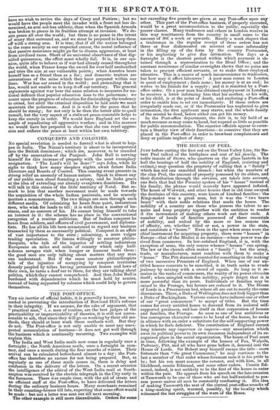THE HOUSE OF PEEL.
JUST before cutting the first sod on the Trent Valley Line, Sir Ro- bert Peel talked of the birthplace and seat of his family. The noble inmate of Stowe, who quarters on the glass lantern in his hall the bearings of half the nobility of England, (existing and extinct,) may question the propriety of calling that a " family" which has not one ennobled branch : but when the numbers of the clan Peel, the amount of property possessed by its elders, and their distribution through the services, are taken into account, one feels that had the Premier spoken of his " house" instead of his family, the phrase would scarcely have appeared inflated. The house of Warwick, and other houses that in old time swayed the destinies of this country, were knots of kindred families : the King-maker was a great man, but it was the "two brave bears" with their noble relations that made the house. The nobility of a country are those who possess the talent to ac- quire and keep property together with the ambition to render it the instrument of making others work out their ends. A number of heads of families possessed of these essentials of nobility, and united by the more or less remote ties of affinity, are, whether titled or not, a power in the state, and constitute a "house." Even in the ages when arms were the chief instrument for acquiring property, there were " houses " in Europe—that of the Medici is an instance—whose power was de- rived from commerce. In law-subdued England, it is, with the exception of arms, the only source whence " houses " can spring. The law or the church often makes a " family " ; but the army, trade, or manufactures, must combine with them to make a "house." The Pitt diamond counted for something in the making of two successive Premiers of England. When one of our un- titled houses consents to be ennobled, it in truth seeks to evade jealousy by mixing with a crowd of equals. So long as it re- mains in the ranks of commoners, the reality of its power obtrudes itself; when mingled with the nobility, people forget that it is more powerful than its peers. Individuals or families may be raised to the Peerage, but houses are reduced to it. The House of Lords is a Procrustean bed, where all are cut to nearly the same dimensions. There, a Duke of Wellington does not look bigger than a Duke of Buckingham. Various causes have induced one or other of our "great commoners" to accept of titles. But the time comes for every untitled house to descend from its isolated self- supported greatness, and lose itself in that corporation of houses and families, the Peerage. As soon as one of less ambitious or less courageous character comes to be head of the house, he seeks in alliance with an order a substitute for the self-supporting power in which he feels deficient. The constitution of England cannot long tolerate any imperium in imperio—any association which owes its political power to its own resources independent of its re- cognized place in the social organization. The house of Peel must in time, following the example of the houses of Fox, Walpole, Pulteney, Pitt, and all who have gone before it, descend into the House of Lords. Sir Robert may himself escape the title—more fortunate than "the great Commoner," he may continue to the last a member of that order whose foremost man it is his pride to be ; but his son must assume the coronet, and with him,, in all likelihood, cousin Edmund, and some other cadets. Cousin Ed- mund, indeed, is not unlikely to be the first of the house to enter within the pale. He appears from his speech on the late occasion at Tamworth to be one of those who are but half-satisfied to pos- sess power unless all men be constantly confessing it. His idea of making Tamworth the seat of the central post-office smacks of a king-making: spirit, warmed, possibly, by the locality which witnessed the fast struggles of the wars of the Roses.


























 Previous page
Previous page